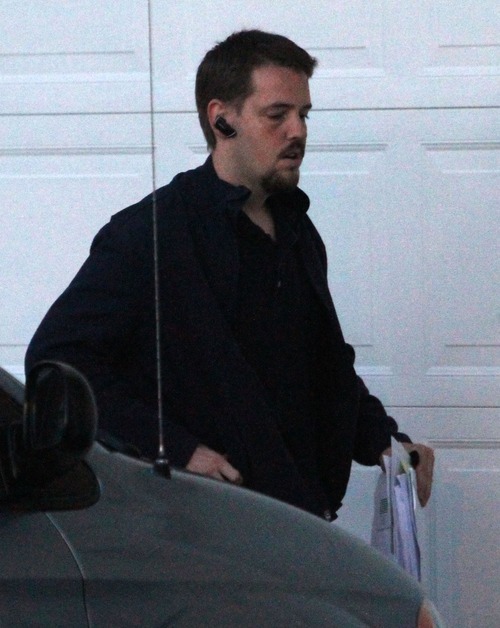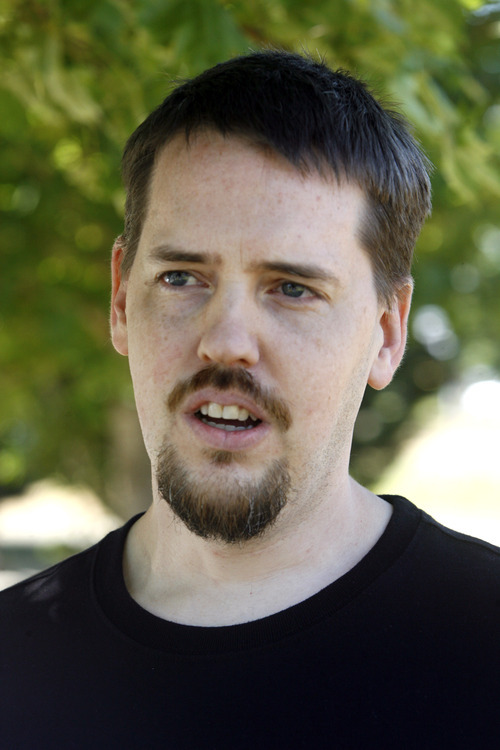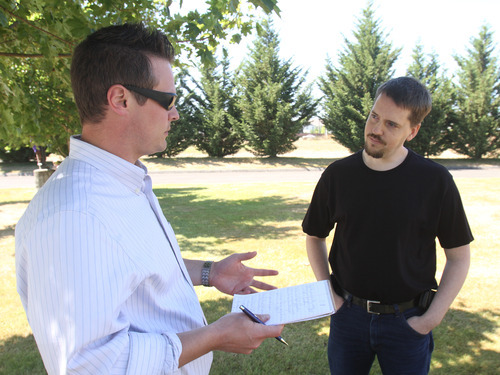This is an archived article that was published on sltrib.com in 2012, and information in the article may be outdated. It is provided only for personal research purposes and may not be reprinted.
Husband. Antisocial. Father. Awkward. Person of Interest. Erratic. Loving. Controlling. Abusive.
All are words that have been used to describe Josh Powell, 36, but there is only one that will forever be associated with his name.
Murderer.
Powell took his own life, and that of his two sons, Charlie, 7, and Braden, 5, when he set his Washington state home on fire with all three inside Sunday afternoon.
Not only did he leave a gaping hole in the lives of those who knew and loved his sons, but he may have created a permanent question mark over the disappearance of his wife, Susan Cox Powell, who vanished in 2009. Any answers in that case may have gone up with the billowing, black smoke over the town of Graham.
Home life • Josh Powell grew up in the town of Puyallup, Wash. He attended Rogers High School with his future wife, Susan Cox, but it wasn't until the two went to a singles ward activity of The Church of Jesus Christ of Latter-day Saints that they met. They married a short while later, in April 2001, at the Portland LDS temple.
They found an apartment together a few miles away from her parents.
The couple managed an assisted-living facility for a while in Washington, but they weren't making enough to start a family.
His parents-in-law, Chuck and Judy Cox, thought of him as having an odd sense of humor and being somewhat off-beat, but they just chalked it up to him being himself. They grew frustrated, though, as the couple began showing up hours late to family functions, a departure from their daughter's normal behavior. They describe him as easily losing track of time and acting on the spur of the moment.
Silently, the Coxes wondered if their son-in-law might have had a mental illness, knowing he had a relative who suffered from bipolar disorder. But they kept quiet, trying to lend support to their daughter's new marriage.
The couple moved to Utah in about 2004 to be closer to Josh Powell's mother and two sisters, who had earlier moved to the state.
At their West Valley City home, Josh Powell would teach neighbor kids basic woodworking skills. He enjoyed playing with radio-controlled cars, gardening and landscaping.
He operated a home-based business called Polished Marketing that created Web sites and logos for business. He also worked as a computer programmer for a trucking and warehousing company.
As time went on, religion began to become a point of contention for the couple. Susan continued to attend church regularly, but Josh's attendance became increasingly sporadic. Their financial situation also began adding strain. In a bankruptcy filing, Josh Powell listed more than $200,000 in credit card, furniture, student loan and other debts. Those debts began taking their tolls on the marriage.
Losing control • Even before the pressures of the bankruptcy, Susan Powell's friends were counseling her to leave her husband. He had become increasingly controlling and emotionally abusive.
At least once, he was physically abusive, according to Susan Cox Powell's family members, but she never sought medical treatment or filed a police report.
He also began forcing her to garden in order to grow food for the family, refusing to give her money to buy groceries.
The couple entered counseling, but she began planning an escape route, opening a bank account only she had access to. Several times he threatened to take their sons and leave her. It was a threat she took seriously, telling her friends she was terrified he would make good on his threats and leave her with nothing.
Winter camping • On Dec. 7, 2009, Susan Cox Powell disappeared.
Her purse and keys were still in the home.
Josh Powell said he took his sons, then 3 and 5, on a midnight camping trip in below-freezing temperatures.
He came back with windburned hands, and instead of focusing on his missing wife, he lamented to neighbors about having to buy new clothes after police took his as evidence.
The man gave bizarre on-camera interviews to television media when asked him about his wife's disappearance.
He refused multiple times to meet with the West Valley Police Department to answer questions about his wife's disappearance. Instead, he hired a lawyer and then moved back in with his father, Steve Powell, in Puyallup, Wash., after losing his job.
He stopped talking with the media, and while he occasionally showed up for vigils, he withdrew from the search for his wife. He stuck by his claim that she had simply left the family, saying she would be "chewed up like hamburger" upon her return. Steve Powell defended his son's version of events.
Then, on Sept. 22, 2011, Steve Powell was arrested and charged with possession of child pornography, and Josh Powell's two boys were taken into state custody. Five days later, they were placed with the Coxes.
The end • Josh Powell was infuriated that his children had been taken from him.
He gave television interviews refuting the claims the state had made as justification for removing the boys.
After an initial court-ordered psychological evaluation, he was told last week that he would not get the boys back because of "explicit images" found in his West Valley City home. He was also ordered to undergo a pyschosexual evaluation and polygraph test, and he wouldn't have the opportunity to get his boys back until July. Until then, he had twice-weekly visits.
In a December court filing, he wrote about his love for his sons.
"My sons and I have a very close relationship and I am working diligently to get them back in spite of the lies people are saying about me," he wrote. "Everyone who knows me understands that my children have always come first."
That closeness on the boys' part may explain why his sons reportedly ran to him excitedly as he ushered them into his home and to their deaths on Sunday.
It was a moment that will forever label him in people's minds as the man who murdered his children.
Twitter:@sheena5427
Tribune reporter Erin Alberty contributed to this report.







